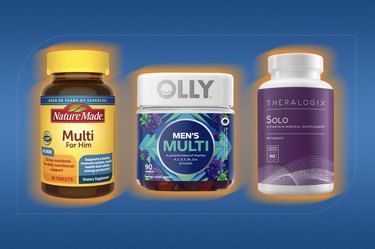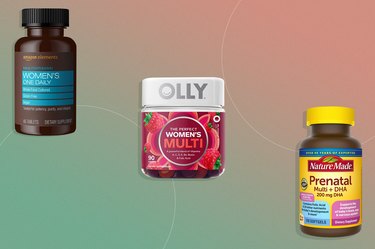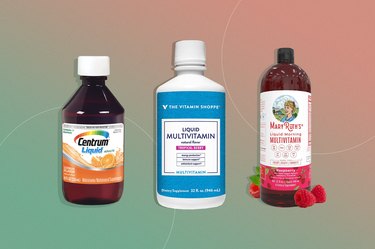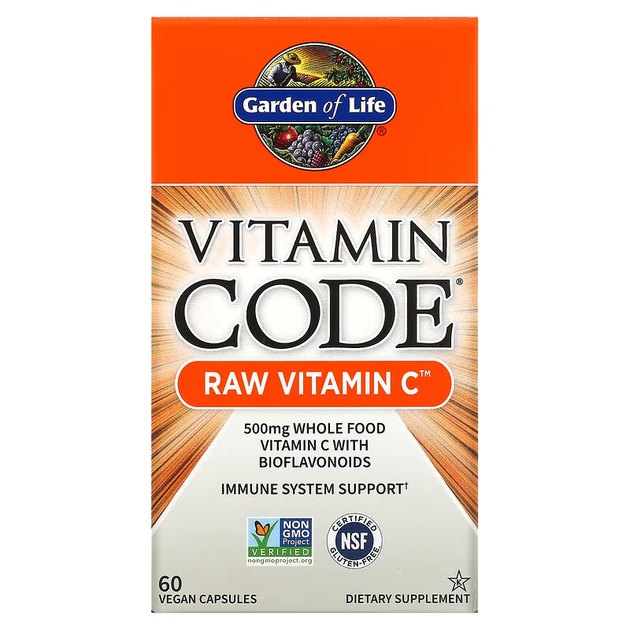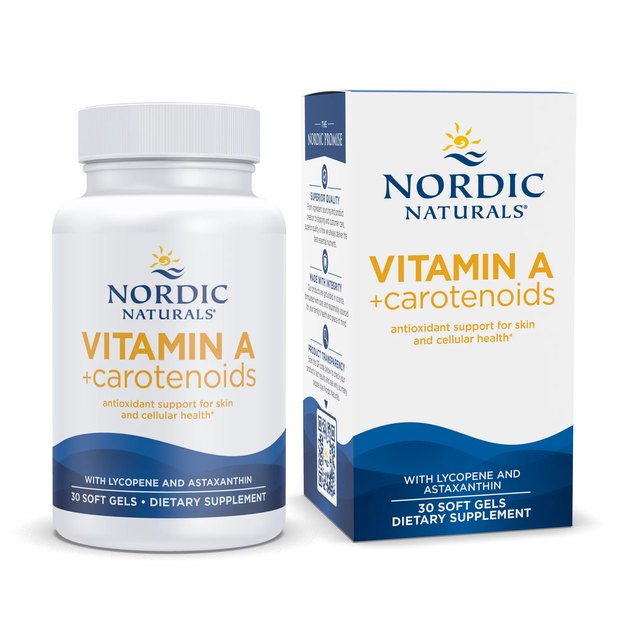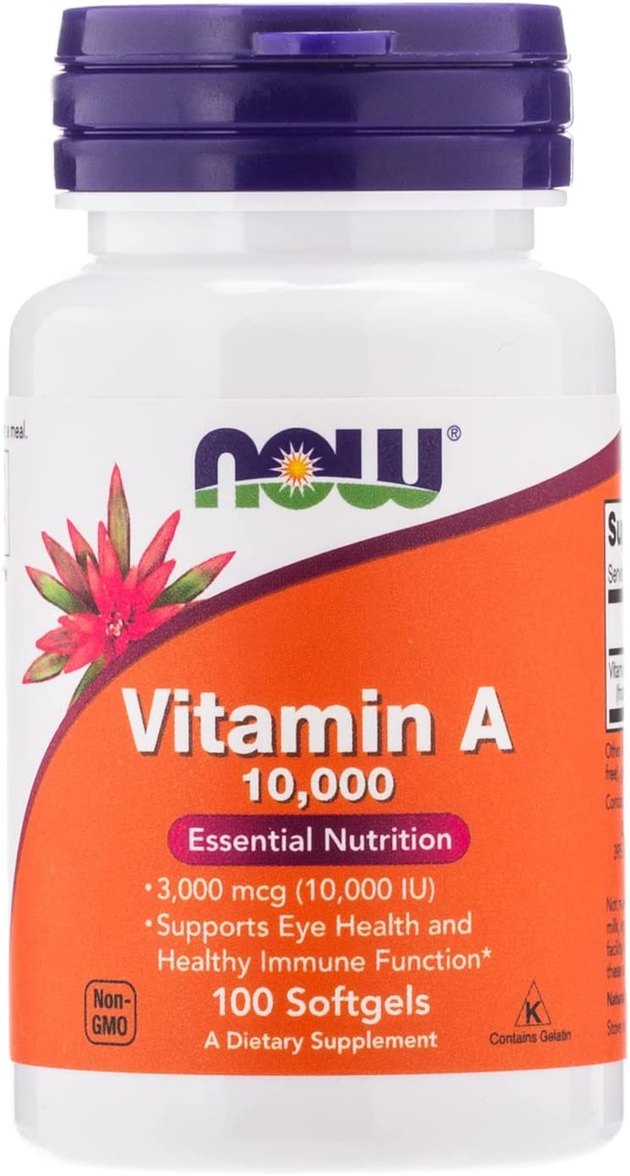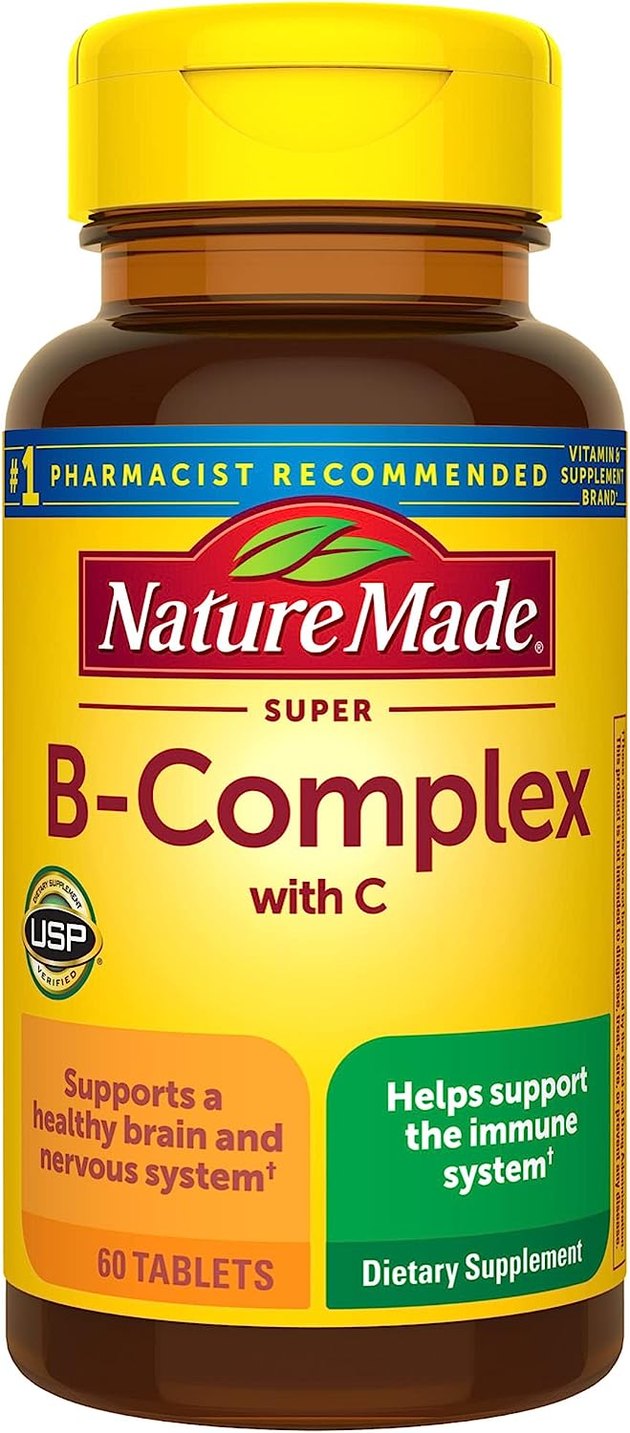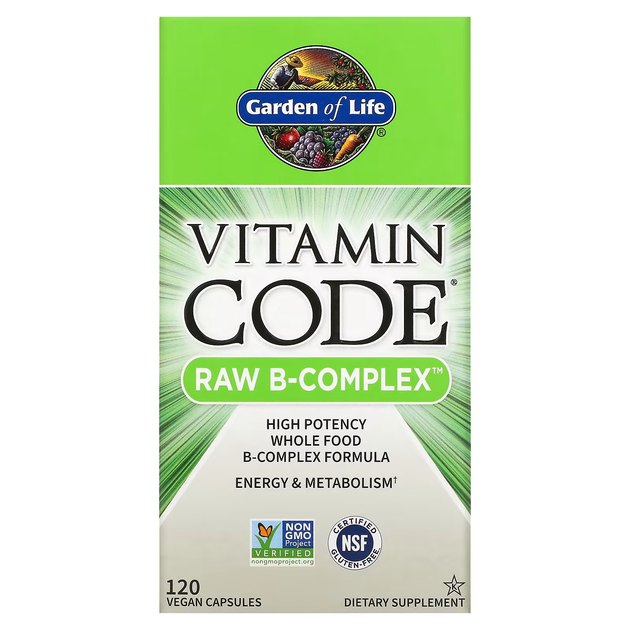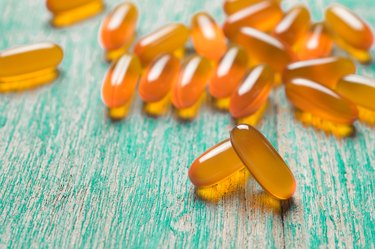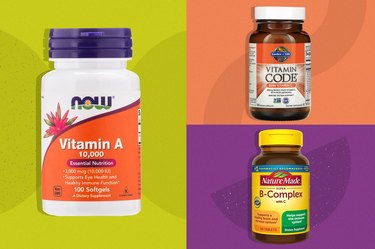
Surgery itself may be a relatively brief process that's over in hours, but it's hard on your body, and a full recovery can often take weeks or months. So it's only natural to want to support the healing process — and getting certain nutrients can make a difference.
"Nutrition is a critical component of surgical recovery," says Alexander Zuriarrain, MD, FACS, a quadruple board-certified plastic surgeon with Zuri Plastic Surgery.
Video of the Day
Video of the Day
That's not to say vitamins alone will heal you. But certainly, getting enough protein along with certain vitamins and minerals can support your body's ability to recover, including your wound healing and immune function, Dr. Zuriarrain says.
First, Do You Need a Supplement?
You can take vitamins after surgery (i.e. supplements), but keep in mind that the best way to get your after-surgery vitamins is through food.
"The best way to get all your vitamins and minerals is through a variety of fruits and vegetables," says Alex McDonald, MD, a family physician specializing in nutrition and chronic condition management.
Bottom line: Most people don't need to take supplements. "If you have a typical American diet, you have plenty of minerals and vitamins in your everyday foods," Dr. McDonald says.
But perhaps you don't always eat perfectly. Maybe the anticipation of surgery has made cooking less appealing or led to dietary changes.
In that case: "[Taking] a daily multivitamin is a good insurance plan to make sure you're getting all the vitamins and minerals that you do need," Dr. McDonald says.
There's no need to seek out a special blend, though. The best multivitamin after surgery is the same as the basic multivitamin you'd take even if you weren't undergoing a medical procedure, says Tracey Childs, MD, a board-certified general and colorectal surgeon and the vice chair of surgery at Providence Saint John's Health Center in Santa Monica, California.
Here are a few options:
Warning
Talk to your doctor before taking a supplement either before or after surgery. “It is very important to speak to your surgeon regarding vitamin consumption,” Dr. Zuriarrain says. That’s because some vitamins can lead to unwanted side effects or complications, such as bleeding or bruising, he says. Another risk is that you might take something that interacts with the anesthesia, Dr. McDonald says.
Your best bet: Get a lab panel beforehand if you’re concerned you might be low on vitamins or nutrients, Dr. Zuriarrain says. And make sure to share a full list of any supplements you’re taking with your doctor and the anesthesiologist prior to surgery, Dr. McDonald says.
With all that in mind, here are the best vitamins for healing after surgery, according to research and the doctors we spoke with.
1. Vitamin C
First up: vitamin C. There's more data on vitamin C's effect on healing wounds than other vitamins, Dr. Childs says.
For instance, one small study of people having a laparoscopic hysterectomy found those who had vitamin C around the time of their surgery used fewer pain relievers and experienced less post-laparoscopic shoulder pain, per an April 2019 study in Anesthesia and Pain Medicine.
And in a randomized trial, researchers found that, for people who'd had foot and ankle trauma surgery, vitamin C supplementation reduced the need for pain relievers and led to study participants achieving a better functional outcome, according to August 2019 findings in European Foot and Ankle Society.
Vitamin C "allows collagen cross-linking, which strengthens wounds," explains Dr. Zuriarrain.
To back up, collagen is a protein found in your skin, muscles, tendons and tissue, according to the Cleveland Clinic. Importantly, it's found in connective tissue, which is key for wound healing, according to the National Institutes of Health (NIH).
Everyone should have vitamin C both before and after surgery, Dr. Zuriarrain says. Incorporating it into your diet is easy — vitamin C-rich foods include the following (a serving of any of these gives you more than 100 percent of your daily value of C):
- Bell peppers
- Broccoli
- Brussels sprouts
- Guava
- Kiwi
- Oranges
- Strawberries
Or you can take a supplement. In terms of dosage, keep in mind that the recommended dietary allowance (RDA) for vitamin C is 75 to 90 milligrams for adults, per the NIH.
While vitamin C is a water-soluble vitamin (meaning it doesn't build up in the body), if you take too much (more than the upper limit of 2,000 milligrams a day) you may experience some GI distress, per the Mayo Clinic.
"Patients should be taking it 30 days before surgery and an additional 60 days after surgery," Dr. Zuriarrain says.
Of course, speak to your own surgeon or primary care doctor before adding vitamin C — or any other supplement — to your regimen.
The Best Vitamin C Supplements for After Surgery
2. Vitamin A
Vitamin A helps with the development of bone and soft tissue, and it also plays a role in immune system function, Dr. Childs says. It helps maintain epithelial tissues — one of the four types of tissue in your body, found in your skin and on the lining of some organs, per Cleveland Clinic — and is also important for protein synthesis, Dr. Zuriarrain says.
Food sources of vitamin A include:
- Beef and lamb liver
- Butternut squash
- Cantaloupe
- Carrots
- Clams
- Collard greens
- Spinach
- Sweet potato
This is another vitamin Dr. Zuriarrain recommends taking for 30 days prior to surgery and 60 days afterward.
The Best Vitamin A Supplements for After Surgery
Warning
Vitamin A is fat-soluble, which means taking too much could lead to vitamin A toxicity, per the National Library of Medicine. The tolerable upper limit for vitamin A for adults is 3,000 micrograms, according to the NIH.
3. Vitamin B
There's research to support that some B vitamins may be beneficial following surgery. For instance, B1 (thiamine) and B5 (pantothenic acid) may help with both wound healing and skin health, according to Mount Sinai.
Another potentially helpful vitamin is B12, Dr. Childs says. In animal studies, vitamin B12 reduced pain, according to an article in the September-October 2021 issue of Military Medicine.
In one in-vitro study, certain combinations of B vitamins improved wound closure rates by up to 30 percent, per May 2018 findings in Advances in Skin and WoundCare.
Taking B complex vitamins in combination with an NSAID led to a bigger reduction in pain than simply taking an NSAID, according to clinical studies cited in the Military Medicine article.
Vitamin B-rich foods include the following:
- Avocados
- Brown rice
- Chicken
- Edamame
- Lentils
- Salmon
- Spinach
The Best Vitamin B Supplements for After Surgery
4. Vitamin E
"The world thinks that if you pop a vitamin E capsule and run it on your incision, it's going to get better and prevent scar formation," Dr. Childs says. But that might not be quite so certain.
While it's know that vitamin E is an antioxidant and helps stabilize cell membranes, there isn't necessarily evidence to support that these vitamin E functions translate to helping wounds heal.
"But it can't hurt," Dr. Childs says.
With vitamin E, as Dr. Childs indicates, it may be most helpful to apply it topically, rather than ingesting it orally.
That said, it also doesn't hurt to eat foods with vitamin E as part of a healthy diet. These include:
- Almonds
- Asparagus
- Avocado
- Bell pepper
- Butternut squash
- Salmon
- Shrimp
- Spinach
- Sunflower seeds
- Trout
Warning
Because vitamin E interacts with many medications and can increase the risk of bleeding, do not take this vitamin before surgery without consulting your doctor, per Mount Sinai.
5. Minerals
Along with vitamins, there are other nutrients that can be quite beneficial when it comes to recovery after surgery, including:
Zinc
As with vitamin C, this trace mineral is very important when it comes to wound healing, Dr. Zuriarrain says. The benefits of zinc include immune support, and it plays a role in all stages of wound healing, per a January 2018 article in Nutrients.
Most people get enough zinc from their diet (it's in foods like beef, turkey, pork, tofu and sweet potatoes), but if you're concerned you're falling short, consider trying one of the best zinc supplements.
Dr. Zuriarrain recommends taking 11 milligrams daily for 30 days prior to any surgery, and 60 days following.
Bear in mind that while having a zinc deficiency can impede healing from wounds, "the impact of zinc supplementation on wound healing in patients without zinc deficiency is less well known," according to the Nutrients article authors.
That is, taking zinc if you're short on it may be very meaningful, but if you're already getting sufficient amounts of this micronutrient, supplementing may not offer any benefits.
Copper
This mineral "preserves the strength of skin, blood vessels [and] connective tissue," and it plays a role in enzymatic reactions in the body, Dr. Zuriarrain says.
You don't need much copper per day — 0.9 milligrams is the recommended amount for adults, per the NIH — and it's easy to get enough from your diet. Foods high in copper include tofu, sweet potatoes, cashews and chickpeas, to name a few.
Omega-3s
Another potentially useful nutrient is omega-3 fatty acids. Omega-3s are important for cell metabolism and help protein synthesis, Dr. Childs says. That's important for healing, she notes.
Foods high in omega-3s include flax and chia seeds, walnuts, tofu and fatty fish like salmon and herring.
While people used to be advised to stop taking fish oil prior to surgery to reduce bleeding risks, more recent research points to this being unnecessary. For instance, a November 2018 randomized trial found that taking fish oil did not increase bleeding during surgery, or during the recovery period, per findings in Circulation: Cardiovascular Quality and Outcomes.
And again, there may be benefits to taking it after surgery, because it potentially reduces postoperative complications, according to an April 2022 study in Cureus, which examined the outcome of taking fish oil supplements for people operated on for perforation peritonitis (a type of GI infection).
What to Know Before You Buy a Supplement
There simply isn't a lot of regulation with supplements. "Even if the label says 'X,' it may have very little of X and a lot of Y," Dr. McDonald says. For that reason — and others — it's wise to be cautious when purchasing supplements. Here's what to keep in mind:
1. Seek Out Reputable Supplement Brands
Because of the lack of regulation with supplements, it's best to opt for a well-known and reputable brand and not a "hole-in-the-wall" one, Dr. McDonald says.
Here are five trustworthy vitamin brands to put on your roster: Kirkland, Life Extension, Nature Made, Nordic Naturals and Thorne.
2. Look for a Third-Party Seal
Third-party certification can also be a reassuring way to know that what is inside the bottle matches the ingredient list. Look for verification from one of these groups:
- NSF International
- Consumer Lab
- United States Pharmacopeial Convention (USP)
3. Watch the Dosage
With many vitamins, there's no health effect if you overdo it. That's the case for water-soluble vitamins like vitamins C and D, Dr. Childs says. Take too much, and you won't absorb it. That's wasteful in terms of your wallet, but it doesn't have a health implication.
But toxicity can occur with certain vitamins and minerals, such as vitamin A, if you take more than the upper limit. "Your body doesn't get rid of it — it stores it," Dr. Childs says.
With that in mind, always follow dosing instructions on a product's label, and talk to your doctor about the right dosage for you.
- Anesthesia and Pain Medicine: "The efficacy of vitamin C on postlaparoscopic shoulder pain: a double-blind randomized controlled trial"
- European Foot and Ankle Society: "Role of anti-oxidant (vitamin-C) in post-operative pain relief in foot and ankle trauma surgery: A prospective randomized trial"
- Cleveland Clinic: "Collagen"
- National Institutes of Health: "Vitamin C"
- Mayo Clinic: "Is it possible to take too much vitamin C?"
- Cleveland Clinic: "Epithelium"
- U.S. National Library of Medicine: "Hypervitaminosis A"
- NIH: "Vitamin A and Carotenoids"
- Mount Sinai: "Wounds"
- Military Medicine: "Multivitamin Use in Enhanced Recovery After Surgery Protocols: A Cost Analysis "
- Advances in Skin and WoundCare: "Effects of Vitamin B Complex and Vitamin C on Human Skin Cells: Is the Perceived Effect Measurable?"
- NIH: "Vitamin B12"
- NIH: "Vitamin E"
- Nutrients: "Zinc in Wound Healing Modulation"
- NIH: "Omega-3 Fatty Acids"
- Circulation: Cardiovascular Quality and Outcomes: "Fish Oil and Perioperative Bleeding"
- Cureus: "Role of Omega-3 Fatty Acid Infusion in Surgical Outcomes of Perforation Peritonitis Patients: A Randomized Controlled Trial"
- Journal of Anesthesiology and Clinical Pharmacology: "Implementing enhanced recovery pathways to improve surgical outcomes"
- Wound Healing: "Micronutrients, Arginine, and Glutamine: Does Supplementation Provide an Efficient Tool for Prevention and Treatment of Different Kinds of Wounds?"
- Johns Hopkins Medicine: "After Surgery: Discomforts and Complications"
- USDA: "Oranges"
- NIH: "Copper"
- "Journal of Periodontology"; "Effects of Vitamin-B Supplementation"; R.F. Neiva et al.; July 2005
Is this an emergency? If you are experiencing serious medical symptoms, please see the National Library of Medicine’s list of signs you need emergency medical attention or call 911.
